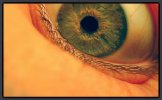
Contours and junctions are important cues for perceptual organization and
shape recognition. Detecting junctions locally has proved problematic
because the image intensity surface is confusing in the neighborhood of a
junction. Edge detectors also do not perform well near junctions. Current
leading approaches to junction detection, such as the Harris operator, are
based on 2D variation in the intensity signal. However, a drawback of this
strategy is that it confuses textured regions with junctions. We believe
that the right approach to junction detection should take advantage of the
contours that are incident at a junction; contours themselves can be
detected by processes that use more global approaches. In this paper, we
develop a new high-performance contour detector using a combination of local
and global cues. This contour detector provides the best performance to date
(F=0.70) on the Berkeley Segmentation Dataset (BSDS) benchmark. From the
resulting contours, we detect and localize candidate junctions, taking into
account both contour salience and geometric configuration. We show that
improvements in our contour model lead to better junctions. Our contour and
junction detectors both provide state of the art performance.
Download: pdf
Text Reference
Michael Maire, Pablo Arbelaez, Charless C. Fowlkes, and Jitendra Malik.
Using contours to detect and localize junctions in natural images.
In
CVPR. 2008.
BibTeX Reference
@inproceedings{MaireAFM_CVPR_2008,
AUTHOR = "Maire, Michael and Arbelaez, Pablo and Fowlkes, Charless C. and Malik, Jitendra",
TITLE = "Using Contours to Detect and Localize Junctions in Natural Images",
BOOKTITLE = "CVPR",
YEAR = "2008",
TAG = "grouping"
}
